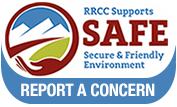Professional Lisensure
Professional Licensure
Important Note for Prospective Students:
If you are considering an academic program that leads to a professional license in the state where you plan on living and working after graduating, it is highly recommended that you first seek guidance from the appropriate licensing agency in that state BEFORE beginning the academic program at RRCC. Please visit specific program webpages for more information.
If you are considering an academic program that leads to professional licensure in the state where you plan on living or working after graduating, please refer to this list to ensure that the professional licensure or certification will be valid in the state you will be working. Programs not listed have no national licensure examination required to practice in the profession.
Early Childhood Education
In all fifty states and in all territories, teachers and directors of early childhood programs must be licensed. These vary widely and we recommend you visit the National Database of Childcare Licensing Regulations website to identify the requirements for the state in which you plan to live and practice. RRCC can only guarantee that the requirements for the state of Colorado are met with the program.
Nurse Aide
All graduated nurse aide students must take and pass the NCLEX Nurse Aide licensure exam in the state or territory where you wish to be licensed. The CCD nurse aide program qualifies graduates to sit for the exam, and practice in: Alabama, Alaska, Arizona, Arkansas, California, Colorado, Connecticut, Delaware, Florida, Georgia, Hawaii, Idaho, Illinois, Indiana, Iowa, Kansas, Kentucky, Louisiana, Maine, Maryland, Massachusetts, Michigan, Minnesota, Mississippi, Missouri, Montana, Nebraska, Nevada, New Hampshire, New Jersey, New Mexico, New York, North Carolina, North Dakota, Ohio, Oklahoma, Oregon, Pennsylvania, Rhode Island, South Carolina, South Dakota, Tennessee, Texas, Utah, Vermont, Virginia, Washington, West Virginia, Wisconsin, Wyoming, Washington D.C., American Samoa, Federated States of Micronesia, Guam, Marshall Islands, Northern Marianas, Palau, Puerto Rico, Virgin Islands.
Phlebotomy
Once program requirements have been met the students can sit for their RPT-AMT certification. This is offered by American Medical Technologists (AMT). AMT certification is accepted in all 50 states.
Radiologic Technologists (Radiography)
Graduates practicing as radiologic technologists in radiography are certified through The American Registry of Radiologic Technologists (ARRT). ARRT certification qualifies radiologic technologists to practice in all fifty United States, American Samoa, Federated States of Micronesia, Guam, Marshall Islands, Northern Mariana, Palau, Puerto Rico and the Virgin Islands. Some states may require an additional state-specific license before working as a radiologic technologist there. For more info visit https://www.arrt.org/.
Physician Assistant
Completing PA education in an ARC-PA (Accreditation Review Commission on Education for the Physician Assistant) accredited program in the United States allows the PA the ability to sit for the NCCPA (National Certification Commission for Physician Assistants) certifying exam. Upon passing the PANCE (Physician Assistant National Certifying Examination), PA-C’s can apply for licensure in any state, U.S. territory, and Canada.
Sonography
The licensing body; ARDMS is a national and globally recognized registry. Currently, New Hampshire, New Mexico, North Dakota, and Oregon are the only states with approved legislation mandating the licensure of sonographers. This means these states will require those who choose to work there to obtain a state license in addition to their national license.
Medical Assisting
Once program requirements have been met, students are eligible to sit for their National certification through the AAMA (American Association of Medical Assistants). This credential is a national certification recognized by employers across the country. Once test is successfully passed they become certified medical assistants and are recognized in all 50 states.
Fire Science (Firefighter I and Hazardous Materials Operations)
The Pro Qual Board and The International Fire Service Accreditation Congress (IFSAC) are the two main certifying bodies in the United State for the fire service. Only two states, South Dakota and Michigan, do not recognize either Pro Board or IFSAC. Those states need to be contacted individually for their reciprocity processes. RRCC fire science programs are recognized by the other forty-eight states.
Medical Billing / Coding
Once program requirements have been met the students can sit for the AAPC certification. This is offered by AAPC for coding and is accepted in all 50 states.
Emergency Medical Technology
Graduates of the EMS programs at Red Rocks Community College are eligible to take certification exams appropriate to their level through the National Registry of EMTs which provides a pathway for certification or licensure in all 50 states and the District of Columbia. Each state issues certifications and licenses to practice in their specific state and have varying reciprocity processes in regards to how NREMT certification is utilized.
Graduates who plan to practice in states other than Colorado should contact the EMS office of the state they plan to move to in order to determine their specific reciprocity policies. An overview of acceptance of NREMT certification and state EMS office contact information can be found at https://nremt.org/resources/state-ems-offices.




